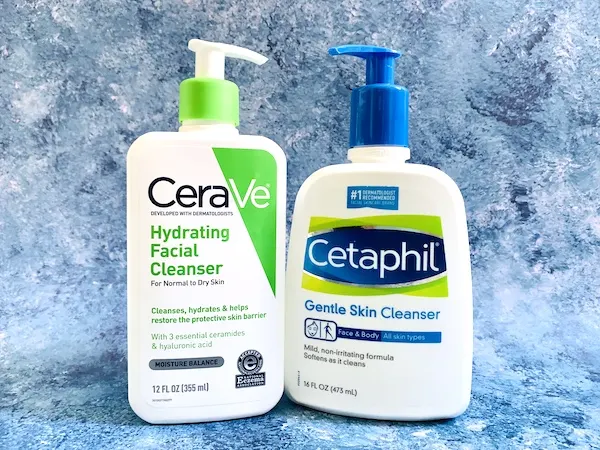
Cetaphil vs Cerave Cleanser
Cetaphil vs Cerave Cleanser? When it comes to skincare, finding the right cleanser can make all the difference but finding the right cleanser can sometimes feel like searching for a needle in a haystack. Two popular options on the market are Cetaphil and CeraVe cleansers. Both brands have loyal followings and boast effective formulations. But how do they stack up against each other? Let’s take a closer look.
Ingredients
Cetaphil: Known for its gentle formula, Cetaphil cleansers typically contain water, cetyl alcohol, propylene glycol, sodium lauryl sulfate, stearyl alcohol, and methylparaben. These ingredients work together to cleanse without stripping the skin of its natural oils.
CeraVe: On the other hand, CeraVe cleansers often feature ceramides, hyaluronic acid, and essential lipids. These components help to hydrate and nourish the skin while effectively removing dirt and impurities.
Texture and Consistency
Cetaphil: Cetaphil cleansers are praised for their lightweight and non-comedogenic formulas. They often have a creamy texture that lathers up nicely when mixed with water, leaving the skin feeling clean and refreshed.
CeraVe: CeraVe cleansers tend to have a richer texture due to the inclusion of ceramides and hyaluronic acid. They may feel slightly thicker on the skin but still rinse off easily, leaving behind a hydrated and smooth complexion.
Suitability for Skin Types
Cetaphil: With its gentle formula, Cetaphil cleansers are suitable for all skin types, including sensitive and acne-prone skin. They are often recommended by dermatologists for their mild and non-irritating nature.
CeraVe: Similarly, CeraVe cleansers are also gentle enough for all skin types, but they are particularly beneficial for those with dry or dehydrated skin. The added ceramides and hyaluronic acid help to restore the skin’s natural barrier and lock in moisture.
Effectiveness:
Cetaphil: Many users appreciate Cetaphil cleansers for their ability to effectively remove makeup, dirt, and oil without causing any irritation. They leave the skin feeling clean and soft without any tightness or dryness.
CeraVe: CeraVe cleansers are known for their hydrating properties and their ability to cleanse the skin without disrupting its natural balance. They can help improve the overall texture and appearance of the skin over time with regular use.
Price Point
Cetaphil: Cetaphil cleansers are often more budget-friendly compared to CeraVe, making them a popular choice for those looking for effective yet affordable skincare options.
CeraVe: While slightly pricier than Cetaphil, many users find that the benefits of CeraVe cleansers justify the higher cost. Plus, a little goes a long way with these products, so they can last a while.
Frequently Asked Questions On Cetaphil vs. CeraVe Cleanser
1. What are the main differences between Cetaphil and CeraVe cleansers?
Cetaphil cleansers are known for their gentle and non-irritating formulas, while CeraVe cleansers contain ceramides and hyaluronic acid for added hydration and skin barrier support.
2. Which cleanser is better for sensitive skin?
Both Cetaphil and CeraVe cleansers are suitable for sensitive skin, but Cetaphil is often recommended for its mild and soothing properties.
3. Do Cetaphil and CeraVe cleansers effectively remove makeup?
Yes, both brands offer cleansers that effectively remove makeup, dirt, and oil without stripping the skin of its natural oils.
4. Are Cetaphil and CeraVe cleansers suitable for all skin types?
Yes, both brands offer cleansers that are suitable for all skin types, including sensitive, dry, oily, and combination skin.
5. Which cleanser is more hydrating?
CeraVe cleansers tend to be more hydrating due to the inclusion of ceramides and hyaluronic acid, which help to lock in moisture and maintain the skin’s natural barrier.
6. Are Cetaphil and CeraVe cleansers fragrance-free?
Yes, both brands offer fragrance-free options for those with sensitive skin or fragrance sensitivities.
7. Can Cetaphil and CeraVe cleansers help with acne-prone skin?
Yes, both brands offer cleansers that are gentle enough for acne-prone skin and won’t clog pores or exacerbate breakouts.
8. Are Cetaphil and CeraVe cleansers tested on animals?
Both Cetaphil and CeraVe are cruelty-free brands, meaning they do not test their products on animals.
9. Are there any differences in price between Cetaphil and CeraVe cleansers?
Generally, Cetaphil cleansers are more budget-friendly compared to CeraVe, but prices may vary depending on the specific product and retailer.
10. Which should I choose: Cetaphil vs Cerave cleanser?
The choice between Cetaphil and CeraVe ultimately comes down to personal preference and skin needs. Both brands offer high-quality cleansers that are well-loved by many users, so it’s worth trying out both to see which works best for your skin.
Conclusion
In the end, both Cetaphil and CeraVe offer excellent cleanser options that cater to a variety of skincare needs. Whether you prefer the simplicity of Cetaphil or the added benefits of ceramides and hyaluronic acid in CeraVe, you can’t go wrong with either choice. It ultimately comes down to personal preference regarding texture, ingredients, price, and what works best for your skin. Regardless of your choice, both brands are trusted favorites among skincare enthusiasts for a reason, and you can’t go wrong with either option. So, next time you’re in the skincare aisle, consider giving one of these tried-and-true cleansers a try.

Leave a Reply